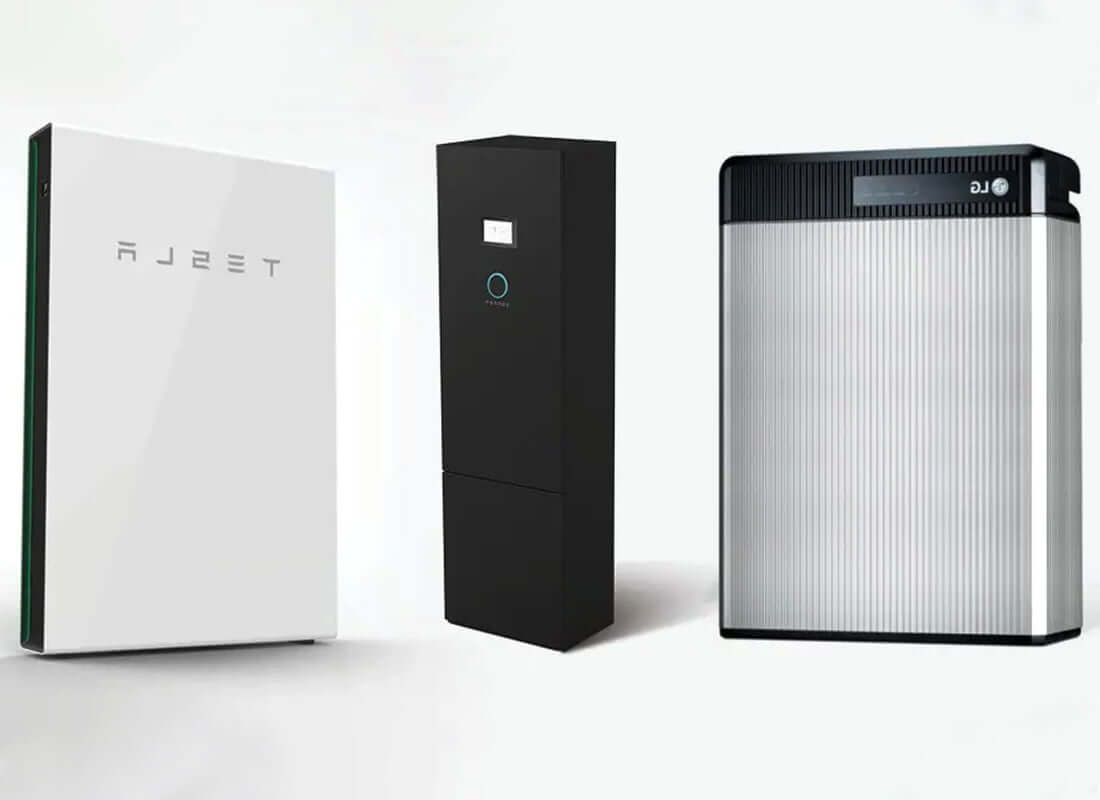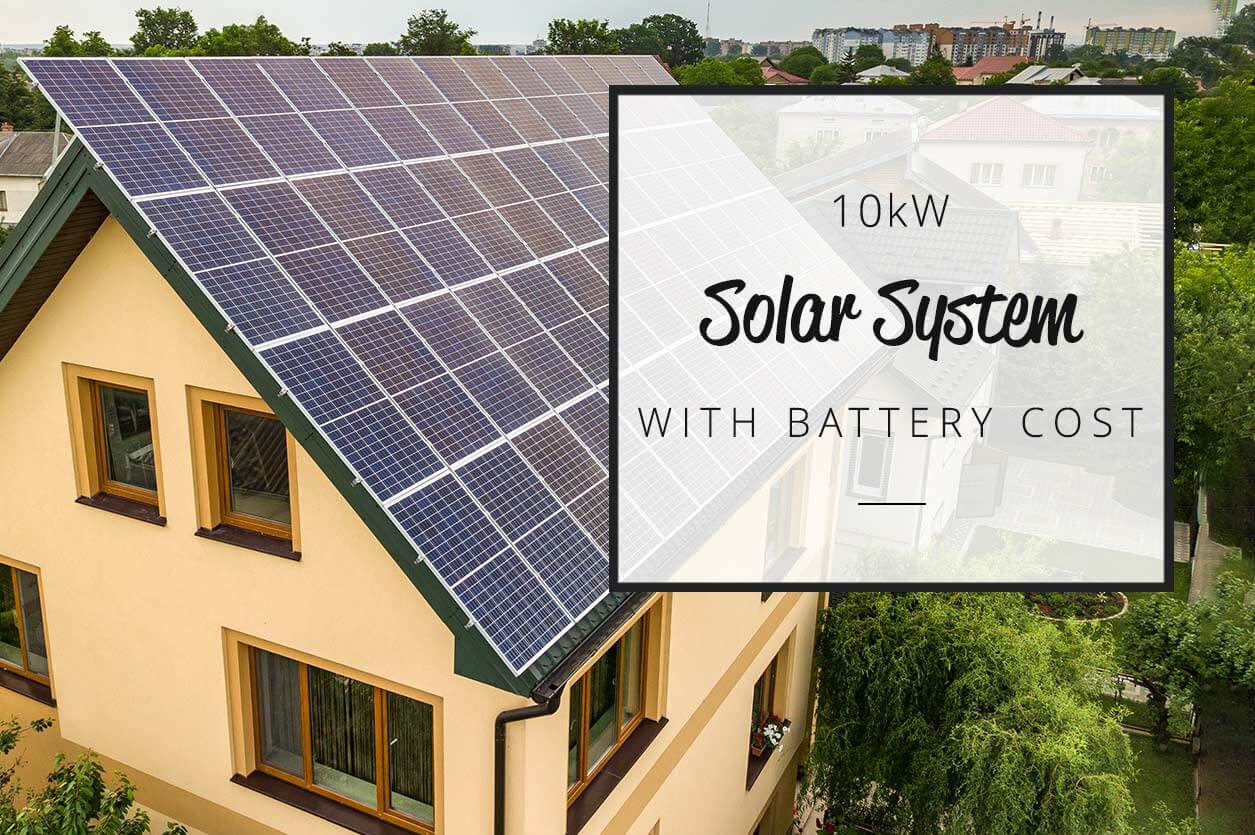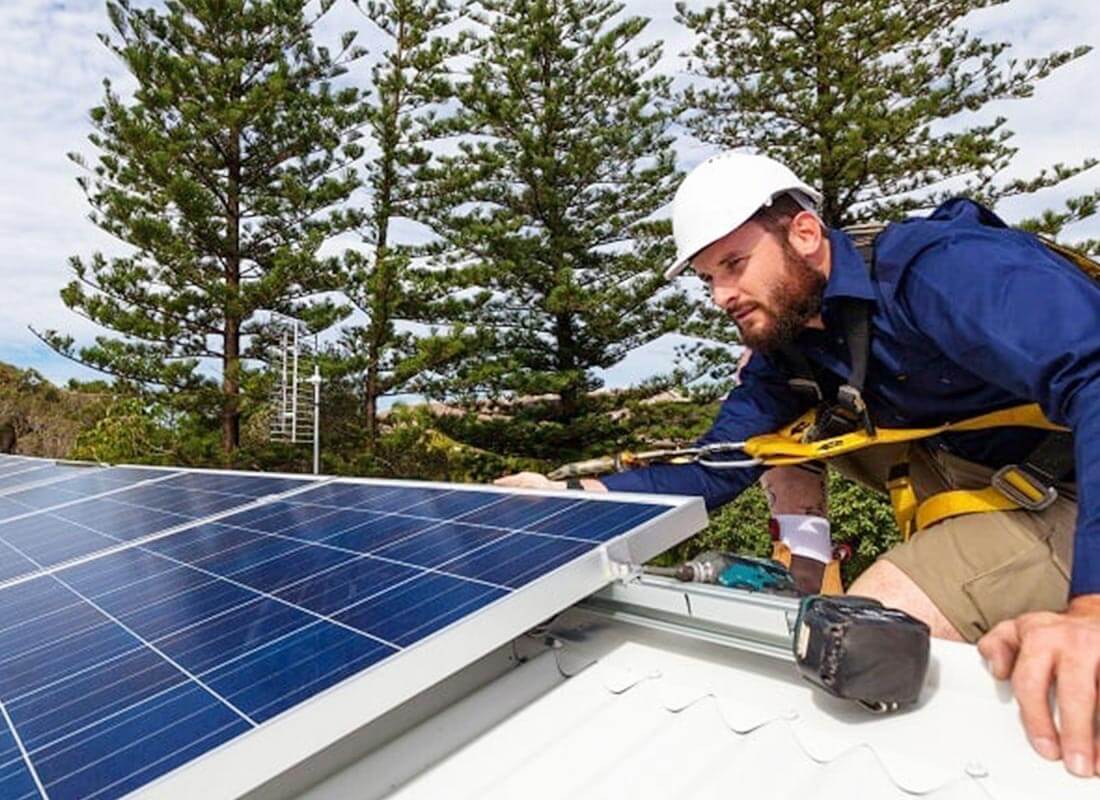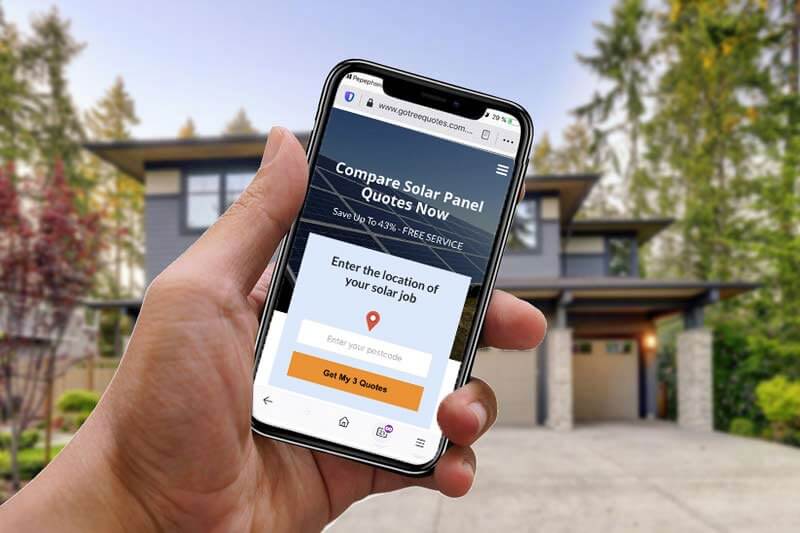Home Cost 10kW Solar System Price 10kw Solar System With Battery Cost
10kW Solar System With Battery Cost
Considering installing a 10 kW solar system with battery storage and eager to find out the cost details? This advanced solution pairs solar panels with energy storage, enhancing sustainability and independence.
On average, a 10 kW solar system with battery costs around $36,819, ranging between $34,270 and $39,370. This price is for a 10 kW solar system plus a 28 kWh solar battery.
Below is a detailed review of the 10 kW solar system with battery storage, including its cost, the recommended battery size, and the potential cost considerations.
Table of Contents
ToggleHow much does a 10kW solar system cost?
A 10 kW solar system costs $9,519 on average, ranging between $8,917 and $10,229. Top-of-the-range systems can cost up to $13,000. This price includes the solar rebate and may differ slightly depending on how much your state pays.
Ideally, the solar rebates are classified according to your state’s STC zone. There are 4 STC zones in Australia, and here is how much a 10 kW solar system costs in each zone.
| STC zone | STC rating | 10kW solar system cost (installed) |
|---|---|---|
| 1 | 1.622 | $8,865 |
| 2 | 1.536 | $9,144 |
| 3 | 1.382 | $9,623 |
| 4 | 1.185 | $10,261 |

What battery size will be ideal for a 10kW solar system?
A 10 kWh solar system generating 40 kWh daily needs a solar battery with at least 28 kWh capacity for optimal energy storage. Batteries with capacities ranging from 25 to 29 kWh can also be used.
This efficient combination ensures surplus energy is captured during peak production, providing reliable power during periods of lower solar output.
Here is how you can calculate the ideal battery size for your system:
Typically, an average Australian home uses about 30% of its total power consumption during the day (when solar panels are generating energy). This means they need to store the remaining 70% to use at night or during power outages and overcast days.
Therefore:
40 kW x 0.7 = 28 kWh
How much does a 10 kW solar system with battery cost?
A 10 kW solar system with a battery costs $36,819, ranging between $34,270 and $39,370.
As we have already established, a 10 kW solar system costs around $9,519, with a typical range of $8,917 to $10,229.
On the other hand, a 28 kWh battery system will cost around $27,300 on average, ranging between $25,400 and $29,200. The cost can vary depending on the battery’s type and brand.
Therefore, a 10 kW solar system with battery storage would cost:
$27,300 + $9,517 = $36,819
Average solar battery system price (fully installed)
The average price of solar batteries is about $12,500 to $14,000 for a 14 kWh battery system such as the Tesla Powerwall 2. The actual cost varies widely depending on your chosen brand and location.
Below is a table displaying the average solar battery installation costs from various installers across Australia. The prices include installation costs and GST.
| Battery size (kWh) | Battery only cost | Battery cost + inverter/charger |
|---|---|---|
| 3kWh | $4,620 | $5,250 |
| 8kWh | $10,000 | $11,280 |
| 13kWh | $13,520 | $14,430 |
| 18kWh | $18, 360 | $19,800 |

Solar battery price per kilowatt
There are different types of battery systems, including lithium-ion, lead-acid, and saltwater batteries. The price per kilowatt ranges from $1,000 to $1,300, but it can be as low as $600 and as high as $2,000.
The table below displays the common battery brands, types, and how much they cost per kilowatt.
| Brand | Type | Price per kWh |
|---|---|---|
| Alpha Ess | Lithium-ion | $668 |
| Sungrows | Lithium-ion | $730 |
| Ampetus Energy | Lithium-iron-phosphate | $756 |
| LG | Lithium-ion | $837 |
| Soltaro 2 | Lithium | $850 |
| Aquion Energy | Lithium | $880 |
| Sungrow-Samsung sbp4k8 | Lithium-ion | $962 |
| Tesla Powerwall 2 | Lithium-ion | $1,000 |
| ZEN Energy | LG Chem RESU10H | $1,000 |
| sonnenBatterie Eco | Lithium-iron-phosphate | $1,071 |
| Fronius Solar Battery | Lithium-ion | $1,111 |
| Redflow Zcell | Zinc-bromine | $1,260 |
| Leclanche Apollion Cube | Lithium iron | $1,380 |
| Simpliphi Batteries | Lithium Ferrous Phosphate | $1,398 |
| Solax | Lithium Ferrous Phosphate | $1,540 |
| Magellan Power | Advanced Lithium Ion (NMC) | $1,610 |
| Enphase Energy | Lithium-iron-phosphate | $1,714 |
| AKASOL’s neeoQube | Lithium-ion | $2,143 |
| Sunverge SIS | Lithium-ion | $2,229 |
| Redback Technologies | Lithium-ion | $2,241 |
| Hansol Technics | Lithium-ion | $2,700 |
What is the best solar battery storage system to install?
There are several great solar battery options, including the Tesla Powerwall 2, LG Chem RESU, and BYD B-Box.
Determining the best solar battery system involves considering factors like efficiency, capacity, and compatibility. For instance, Tesla Powerwall 2 excels in user-friendly features, LG Chem offers high energy density, and BYD B-Box stands out for scalability.
However, the ideal choice depends on individual needs, system requirements, and budget considerations. Consulting with a reputable installer can help tailor the selection to optimise performance and benefits.
Is it worth getting battery storage with solar?
Absolutely! Solar batteries will supply your house with power during the night when your solar panels are not generating energy. Also, with storage batteries, you will still have power in case of a power outage. Batteries also help minimize the electricity you should pull from the grid.
Factors that affect the cost of solar systems with battery storage
Here are some of the factors that may affect the actual cost of installing your solar and battery systems.
- The energy capacity of the solar batteries. The storage capacity of your battery system will determine its overall cost. Batteries with a higher storage capacity will cost more than ones with less storage.
- Household size. The solar system you choose will depend on how many people are in your household and how many appliances you want to run with solar energy.
- Battery type. The type of battery you choose to buy will affect the overall cost of the installation. For instance, Lithium-iron-phosphate (LFP) batteries are costlier than Lead-acid batteries. LFP batteries cost about 30% to 50% more than most cheaper options.
- Quality of the materials. High-quality solar panels and batteries will cost more than low-quality ones. Investing in good quality materials is commendable as you will get value for your money.
- Additional features. If your battery system has upgraded features such as smart technology and inbuilt inverters, you may have to spend more on installation.
- Retrofitting an existing solar system. You will pay more to add a battery system to an existing solar system than when you install them simultaneously.
- Your installation company. Some storage batteries do not come with installation, so you must buy them through the manufacturer and then find a different company to do the installation.
Disadvantages of storing solar power in batteries
- Battery storage systems are relatively expensive, so you must invest lots of money in your preferred system size and type.
- Storage batteries have a shorter lifespan than solar panels. You must replace the batteries after 5 to 15 years to match your panels’ 20 to 30-year lifespan. Replacing and installing the batteries will cost you more money.
- Increased maintenance costs for your solar panels and batteries.
- Your solar system might become more complex once you add a battery system.

DIY vs. Hire a pro to install your solar and battery storage systems
If you are a DIYer with hands-on skills and in-depth knowledge about solar and battery systems, you might consider DIYing your project, provided the systems are small. However, hiring a professional solar installer near you for larger and more complex systems is best.
The professional will:
- Inspect the worksite before the installation
- Professionally install the solar system within a few days
- Hold fast to the manufacturer’s warranty policies
- Answer all your questions and provide guidance
- Recommend products that might be essential for your home
When looking for solar installers, get at least three quotes to compare prices and get the best fit for your project.
Use this free service
The fastest and easiest way to get connected to three of the most reliable and affordable solar installers in Australia would using this FREE service.
GoSolarQuotes.com quickly matches you with three local solar installers voted #1 by previous users in your area. It’s really easy!
- Scroll up to the top of the page and enter your ZIP Code in the blue form.
- Give us details about your solar installation or replacement job, plus some contact information.
- Your solar job details are forwarded to the closest three solar installers, all voted, best priced who will also price your solar job.
In slightly under three minutes, you’ll have your installers!

FAQ's
Home battery systems last for about 5 to 15 years. Solar panels, on the other hand, have a lifespan of between 20 and 30 years. If you install your solar battery system today, you will have to replace them in the future to match the lifespan of your solar power system.
Your solar battery system can power your home for 10 to 15 hours if your household has average demand. However, you may not run heavy appliances like air conditioners, laundry appliances, or dishwashers for long periods as the battery will not last for long. To run high-demand appliances, you will need to install several batteries.
Yes. Most solar battery systems are compatible with solar systems, so you do not need to install a complete set of new panels to go with your new battery system. However, combining different types of batteries is not recommended as they may not work efficiently. Also, the new battery system may need an inverter; in some cases, you may need to install additional solar panels for maximum power production.
Compare Solar Panel Quotes
Table of Contents
Toggle









